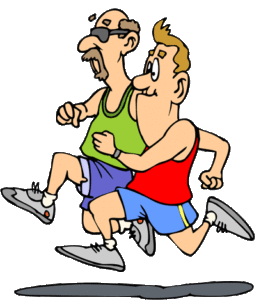“Regular exercise of the type that elevates heart rate is the single most useful thing you can do to maintain your cognitive ability as you age.”
– Drs. Sandra Aamodt and Sam Wang
All of my life, I’ve heard the diet-and-exercise mantra for weight loss. I’ve been told that dieting alone isn’t a good idea. It makes the body think there’s a famine, so it automatically dials down its metabolic requirements to adjust for the reduced caloric intake. Exercise provides the counterbalance that forces the body to keep its metabolic fires burning. But how exactly does that work?
 Digital readouts on aerobic equipment draw our attention to the number of calories burned during workouts. But that’s just the tip of the iceberg. Exercise increases cellular mitochondria. These microscopic organelles generate energy by metabolizing sugars, fats, and other chemical fuels. They’re certainly on the job when I’m expending energy at the gym. But they’re also working hard in my behalf while I’m at rest. By increasing their strength and numbers, I’m burning extra calories 24 hours a day. Once I reach my ideal body mass, they give me the freedom to add healthy food to my daily diet.
Digital readouts on aerobic equipment draw our attention to the number of calories burned during workouts. But that’s just the tip of the iceberg. Exercise increases cellular mitochondria. These microscopic organelles generate energy by metabolizing sugars, fats, and other chemical fuels. They’re certainly on the job when I’m expending energy at the gym. But they’re also working hard in my behalf while I’m at rest. By increasing their strength and numbers, I’m burning extra calories 24 hours a day. Once I reach my ideal body mass, they give me the freedom to add healthy food to my daily diet.
Unfortunately, the bathroom scale may not reward the diet-and-exercise regimen. Lean muscle weighs more than fat. So I could easily drop inches while maintaining (or even gaining) a bit of weight. Fluid retention also confounds the readout from the bathroom scale. That’s why I like to get a full body scan on a fancy-schmancy scale periodically to get a better sense of changes in my lean muscle mass, body fat, and water weight.
Of course, my panel of experts (listed below) would be quick to remind me that diet is about weight, and exercise is about health. There are many more reasons to exercise than just slimming down:
Exercise is heart healthy. It strengthens the heart muscle while lowering plaque-forming cholesterol.
Exercise improves digestion. It puts the lid on overeating through improved leptin signaling. (Leptin tells the brain when the body is full.) It increases the liver’s Krebs cycle to help it burn energy cleaner. It improves insulin sensitivity to support fuel storage in the cells.
Exercise improves lymphatic flow. The lymphatic system disposes of cellular waste, fights infections, and helps maintain body fluids. Because it lacks its own pump (a la the heart for the circulatory system), it needs physical activity to help move things along.
Exercise promotes blood flow to the brain and fortifies neural networks. It expands the size of the memory center, spurs the generation of new brain cells, makes neurons more nimble, and supports multi-tasking abilities. Exercise is essential for healthy aging. In one study, elderly people who exercised 20 minutes per day for 24 weeks demonstrated substantially better memory, language ability, and attention than their sedentary counterparts.
Exercise reduces stress and releases endorphins. It calms the fight-or-flight response (if present) and elevates mood. It can be an effective antidote to anxiety and/or depression.
Exercise activates genes linked to longevity. It is associated with a significant uptick in telomerase, the enzymes that repair damage and stimulate growth in our telomeres. Telomeres reside at the end of our chromosomes and make sure that our DNA strands remain intact. They shorten with age and other stressors. Cells cannot reproduce when their telomeres become unsustainably short.
The experts tell us that exercise must be consistent to confer benefit. Most suggest a minimum of 30 minutes of vigorous effort several times per week. Variety improves effectiveness. For example, cross-training and high intensity interval training have been associated with greater mitochondrial production and longer telomeres. Some benefits also accrue to those who regularly participate in actions of daily living – e.g., cooking, doing dishes, cleaning, gardening.
I’m not fond of exercise, but it sure does the body, mind, and spirit good!
Panel of Experts:
- Sandra Aamodt, PhD and Sam Wang, PhD – Welcome to Your Brain: Why You Lose Your Car Keys but Never Forget How to Drive and Other Puzzles of Everyday Life, ©2008
- Elizabeth Blackburn, PhD and Elissa Epel, PhD – The Telomere Effect: A Revolutionary Approach to Living Younger, Healthier, Longer, ©2017
- Jeffrey S. Bland, MD – The Disease Delusion: Conquering the Causes of Chronic Illness for a Healthier, Longer, Happier Life, ©2014
- Robert H. Lustig, MD – Fat Chance: Beating the Odds Against Sugar, Processed Food, Obesity, and Disease, ©2012
- David Perlmutter, MD – Grain Brain: The Surprising Truth About Wheat, Carbs, and Sugar – Your Brian’s Silent Killers, ©2013